Research Project: Digital Technology's Impact on Travel and Tourism
VerifiedAdded on 2021/01/02
|28
|8557
|414
Project
AI Summary
This research project investigates the influence of digital technology, specifically Information Communication Technology (ICT), on the travel and tourism sector, with a focus on Tourism Union Internation Group (TUI). The project begins with an introduction to the industry and the role of technology, setting the aim to examine ICT's impact and the objectives to understand its concept, determine its significance, identify challenges in implementation, and provide solutions. The research explores factors influencing project selection, including the importance of ICT infrastructure and personal interest in the topic. A critical review of the concept, significance, and challenges of ICT within the tourism sector is presented. The research employs qualitative methodologies, using an inductive approach to analyze theoretical data. The project also covers the research design and appropriate methodologies used to gather relevant information and data. The project concludes with the challenges of ICT implementation, including cost and lack of employee support, and proposes solutions such as employee training and effective ICT policies.
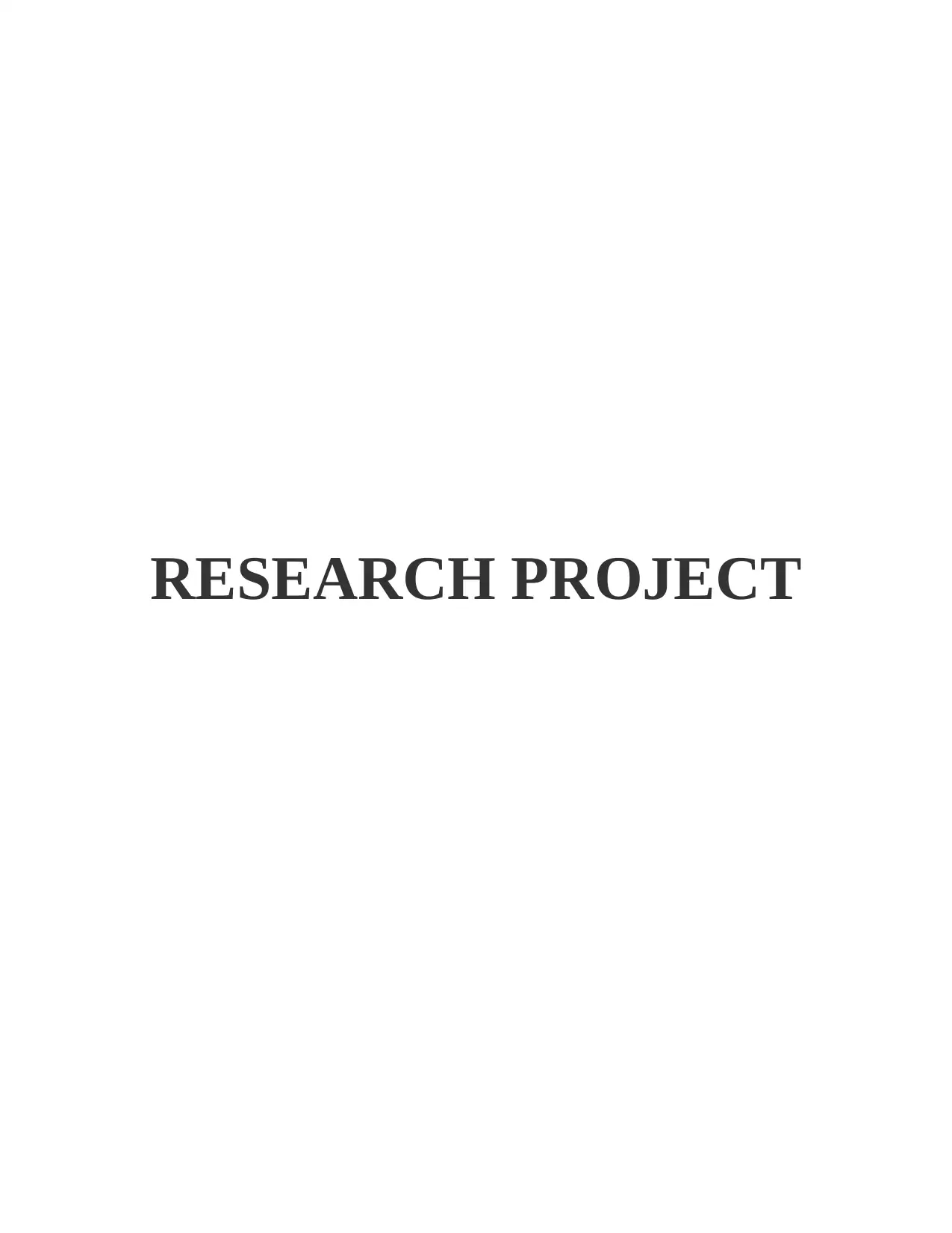
RESEARCH PROJECT
Paraphrase This Document
Need a fresh take? Get an instant paraphrase of this document with our AI Paraphraser
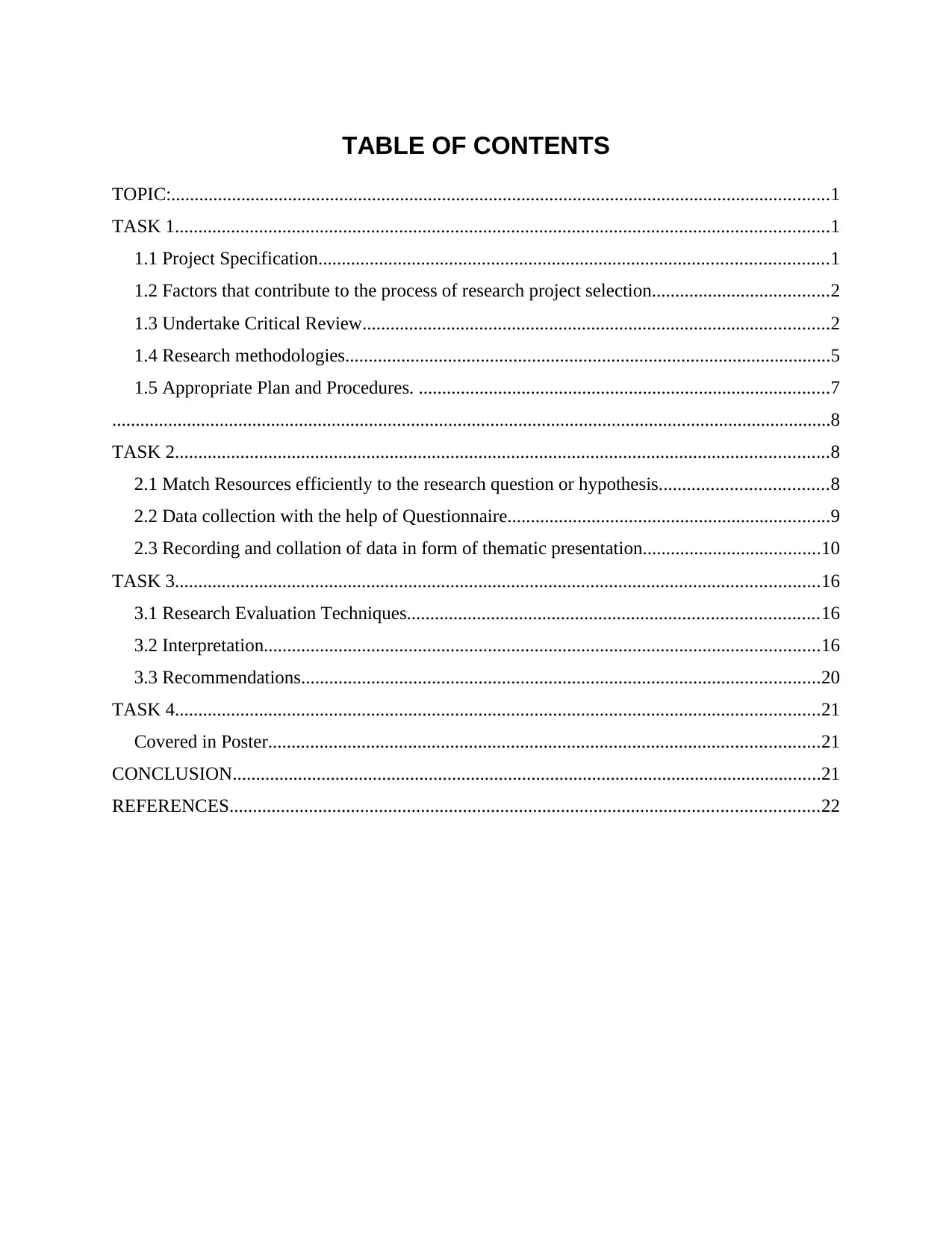
TABLE OF CONTENTS
TOPIC:.............................................................................................................................................1
TASK 1............................................................................................................................................1
1.1 Project Specification.............................................................................................................1
1.2 Factors that contribute to the process of research project selection......................................2
1.3 Undertake Critical Review....................................................................................................2
1.4 Research methodologies........................................................................................................5
1.5 Appropriate Plan and Procedures. ........................................................................................7
..........................................................................................................................................................8
TASK 2............................................................................................................................................8
2.1 Match Resources efficiently to the research question or hypothesis....................................8
2.2 Data collection with the help of Questionnaire.....................................................................9
2.3 Recording and collation of data in form of thematic presentation......................................10
TASK 3..........................................................................................................................................16
3.1 Research Evaluation Techniques........................................................................................16
3.2 Interpretation.......................................................................................................................16
3.3 Recommendations...............................................................................................................20
TASK 4..........................................................................................................................................21
Covered in Poster......................................................................................................................21
CONCLUSION..............................................................................................................................21
REFERENCES..............................................................................................................................22
TOPIC:.............................................................................................................................................1
TASK 1............................................................................................................................................1
1.1 Project Specification.............................................................................................................1
1.2 Factors that contribute to the process of research project selection......................................2
1.3 Undertake Critical Review....................................................................................................2
1.4 Research methodologies........................................................................................................5
1.5 Appropriate Plan and Procedures. ........................................................................................7
..........................................................................................................................................................8
TASK 2............................................................................................................................................8
2.1 Match Resources efficiently to the research question or hypothesis....................................8
2.2 Data collection with the help of Questionnaire.....................................................................9
2.3 Recording and collation of data in form of thematic presentation......................................10
TASK 3..........................................................................................................................................16
3.1 Research Evaluation Techniques........................................................................................16
3.2 Interpretation.......................................................................................................................16
3.3 Recommendations...............................................................................................................20
TASK 4..........................................................................................................................................21
Covered in Poster......................................................................................................................21
CONCLUSION..............................................................................................................................21
REFERENCES..............................................................................................................................22
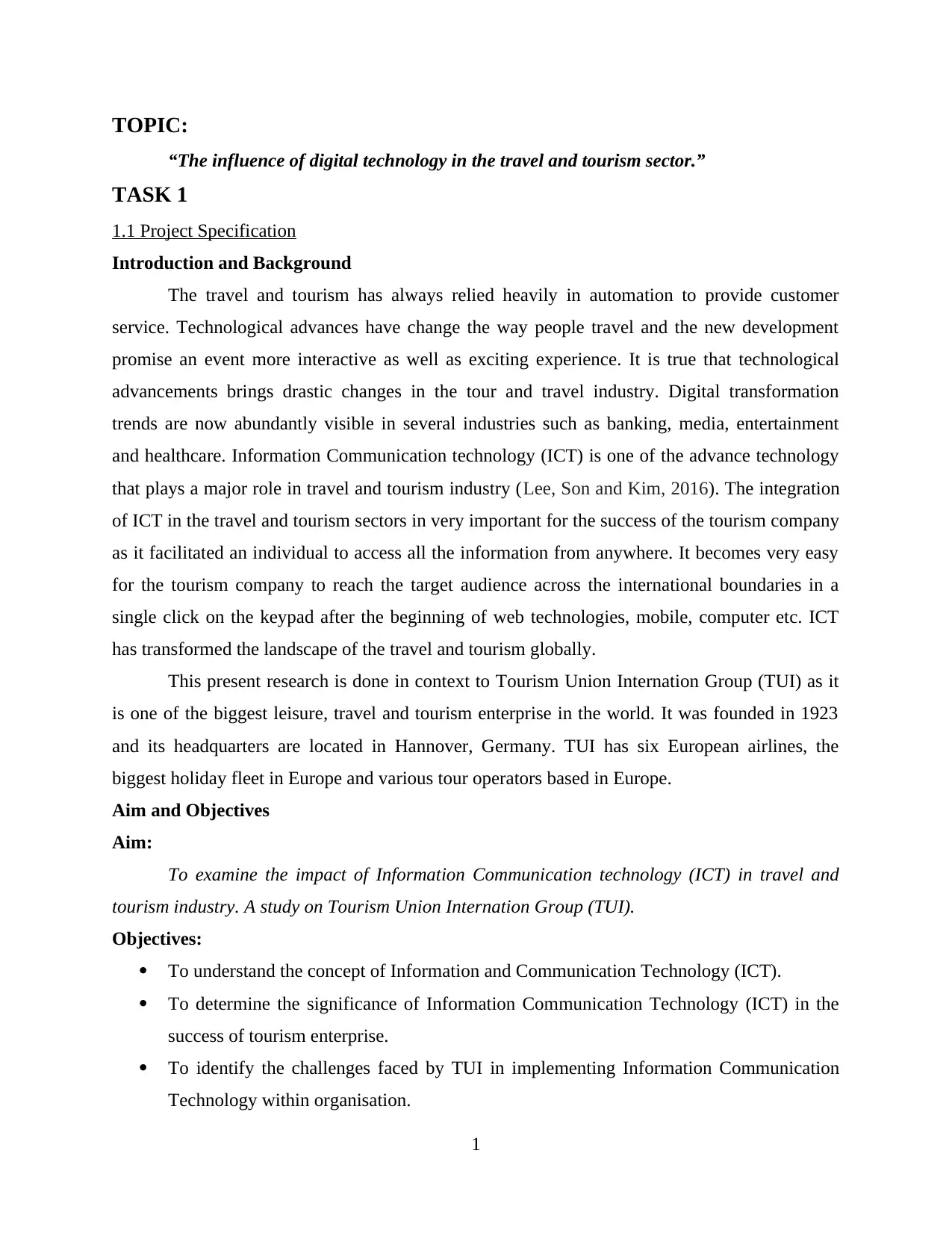
TOPIC:
“The influence of digital technology in the travel and tourism sector.”
TASK 1
1.1 Project Specification
Introduction and Background
The travel and tourism has always relied heavily in automation to provide customer
service. Technological advances have change the way people travel and the new development
promise an event more interactive as well as exciting experience. It is true that technological
advancements brings drastic changes in the tour and travel industry. Digital transformation
trends are now abundantly visible in several industries such as banking, media, entertainment
and healthcare. Information Communication technology (ICT) is one of the advance technology
that plays a major role in travel and tourism industry (Lee, Son and Kim, 2016). The integration
of ICT in the travel and tourism sectors in very important for the success of the tourism company
as it facilitated an individual to access all the information from anywhere. It becomes very easy
for the tourism company to reach the target audience across the international boundaries in a
single click on the keypad after the beginning of web technologies, mobile, computer etc. ICT
has transformed the landscape of the travel and tourism globally.
This present research is done in context to Tourism Union Internation Group (TUI) as it
is one of the biggest leisure, travel and tourism enterprise in the world. It was founded in 1923
and its headquarters are located in Hannover, Germany. TUI has six European airlines, the
biggest holiday fleet in Europe and various tour operators based in Europe.
Aim and Objectives
Aim:
To examine the impact of Information Communication technology (ICT) in travel and
tourism industry. A study on Tourism Union Internation Group (TUI).
Objectives:
To understand the concept of Information and Communication Technology (ICT).
To determine the significance of Information Communication Technology (ICT) in the
success of tourism enterprise.
To identify the challenges faced by TUI in implementing Information Communication
Technology within organisation.
1
“The influence of digital technology in the travel and tourism sector.”
TASK 1
1.1 Project Specification
Introduction and Background
The travel and tourism has always relied heavily in automation to provide customer
service. Technological advances have change the way people travel and the new development
promise an event more interactive as well as exciting experience. It is true that technological
advancements brings drastic changes in the tour and travel industry. Digital transformation
trends are now abundantly visible in several industries such as banking, media, entertainment
and healthcare. Information Communication technology (ICT) is one of the advance technology
that plays a major role in travel and tourism industry (Lee, Son and Kim, 2016). The integration
of ICT in the travel and tourism sectors in very important for the success of the tourism company
as it facilitated an individual to access all the information from anywhere. It becomes very easy
for the tourism company to reach the target audience across the international boundaries in a
single click on the keypad after the beginning of web technologies, mobile, computer etc. ICT
has transformed the landscape of the travel and tourism globally.
This present research is done in context to Tourism Union Internation Group (TUI) as it
is one of the biggest leisure, travel and tourism enterprise in the world. It was founded in 1923
and its headquarters are located in Hannover, Germany. TUI has six European airlines, the
biggest holiday fleet in Europe and various tour operators based in Europe.
Aim and Objectives
Aim:
To examine the impact of Information Communication technology (ICT) in travel and
tourism industry. A study on Tourism Union Internation Group (TUI).
Objectives:
To understand the concept of Information and Communication Technology (ICT).
To determine the significance of Information Communication Technology (ICT) in the
success of tourism enterprise.
To identify the challenges faced by TUI in implementing Information Communication
Technology within organisation.
1
⊘ This is a preview!⊘
Do you want full access?
Subscribe today to unlock all pages.

Trusted by 1+ million students worldwide
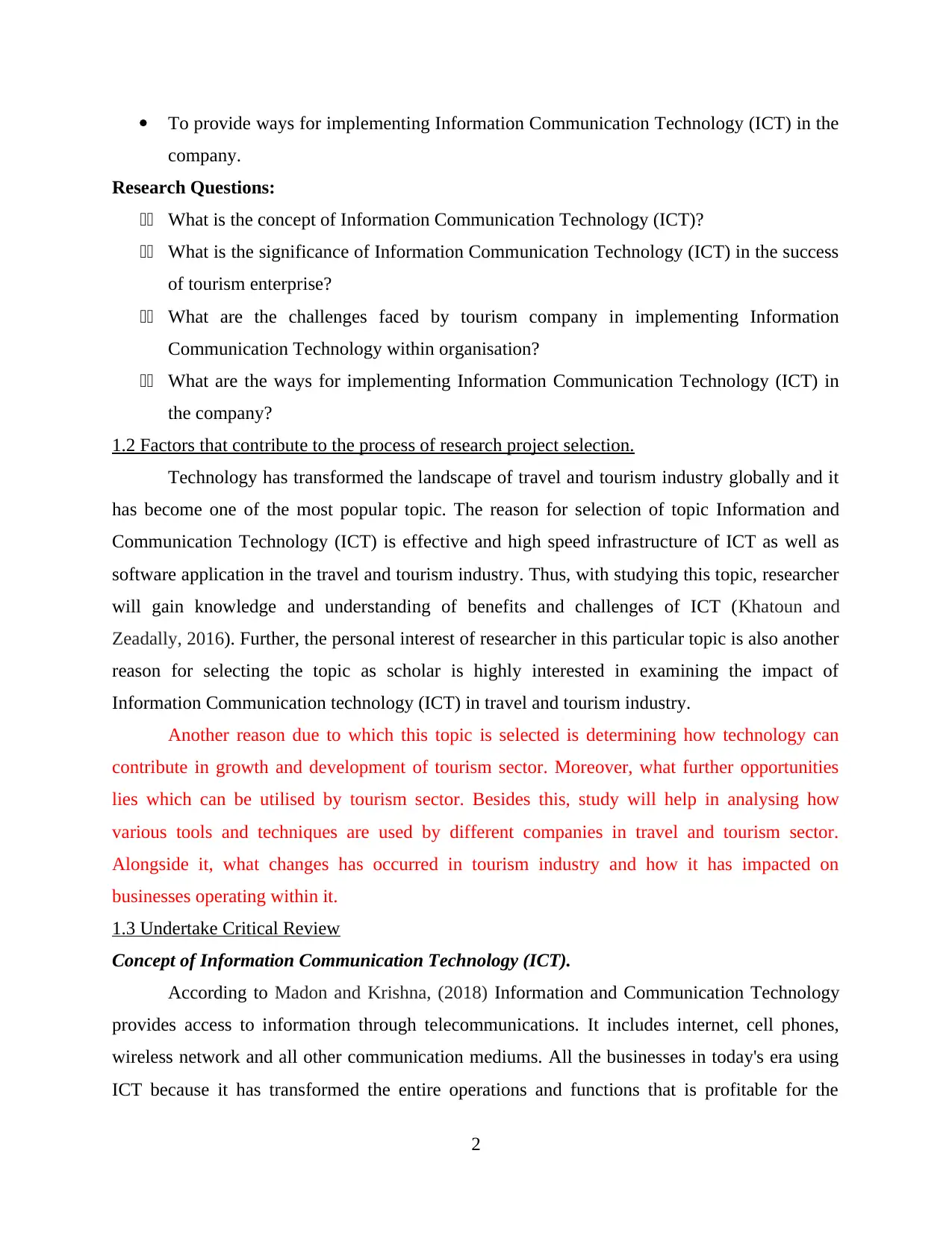
To provide ways for implementing Information Communication Technology (ICT) in the
company.
Research Questions:
11 What is the concept of Information Communication Technology (ICT)?
11 What is the significance of Information Communication Technology (ICT) in the success
of tourism enterprise?
11 What are the challenges faced by tourism company in implementing Information
Communication Technology within organisation?
11 What are the ways for implementing Information Communication Technology (ICT) in
the company?
1.2 Factors that contribute to the process of research project selection.
Technology has transformed the landscape of travel and tourism industry globally and it
has become one of the most popular topic. The reason for selection of topic Information and
Communication Technology (ICT) is effective and high speed infrastructure of ICT as well as
software application in the travel and tourism industry. Thus, with studying this topic, researcher
will gain knowledge and understanding of benefits and challenges of ICT (Khatoun and
Zeadally, 2016). Further, the personal interest of researcher in this particular topic is also another
reason for selecting the topic as scholar is highly interested in examining the impact of
Information Communication technology (ICT) in travel and tourism industry.
Another reason due to which this topic is selected is determining how technology can
contribute in growth and development of tourism sector. Moreover, what further opportunities
lies which can be utilised by tourism sector. Besides this, study will help in analysing how
various tools and techniques are used by different companies in travel and tourism sector.
Alongside it, what changes has occurred in tourism industry and how it has impacted on
businesses operating within it.
1.3 Undertake Critical Review
Concept of Information Communication Technology (ICT).
According to Madon and Krishna, (2018) Information and Communication Technology
provides access to information through telecommunications. It includes internet, cell phones,
wireless network and all other communication mediums. All the businesses in today's era using
ICT because it has transformed the entire operations and functions that is profitable for the
2
company.
Research Questions:
11 What is the concept of Information Communication Technology (ICT)?
11 What is the significance of Information Communication Technology (ICT) in the success
of tourism enterprise?
11 What are the challenges faced by tourism company in implementing Information
Communication Technology within organisation?
11 What are the ways for implementing Information Communication Technology (ICT) in
the company?
1.2 Factors that contribute to the process of research project selection.
Technology has transformed the landscape of travel and tourism industry globally and it
has become one of the most popular topic. The reason for selection of topic Information and
Communication Technology (ICT) is effective and high speed infrastructure of ICT as well as
software application in the travel and tourism industry. Thus, with studying this topic, researcher
will gain knowledge and understanding of benefits and challenges of ICT (Khatoun and
Zeadally, 2016). Further, the personal interest of researcher in this particular topic is also another
reason for selecting the topic as scholar is highly interested in examining the impact of
Information Communication technology (ICT) in travel and tourism industry.
Another reason due to which this topic is selected is determining how technology can
contribute in growth and development of tourism sector. Moreover, what further opportunities
lies which can be utilised by tourism sector. Besides this, study will help in analysing how
various tools and techniques are used by different companies in travel and tourism sector.
Alongside it, what changes has occurred in tourism industry and how it has impacted on
businesses operating within it.
1.3 Undertake Critical Review
Concept of Information Communication Technology (ICT).
According to Madon and Krishna, (2018) Information and Communication Technology
provides access to information through telecommunications. It includes internet, cell phones,
wireless network and all other communication mediums. All the businesses in today's era using
ICT because it has transformed the entire operations and functions that is profitable for the
2
Paraphrase This Document
Need a fresh take? Get an instant paraphrase of this document with our AI Paraphraser
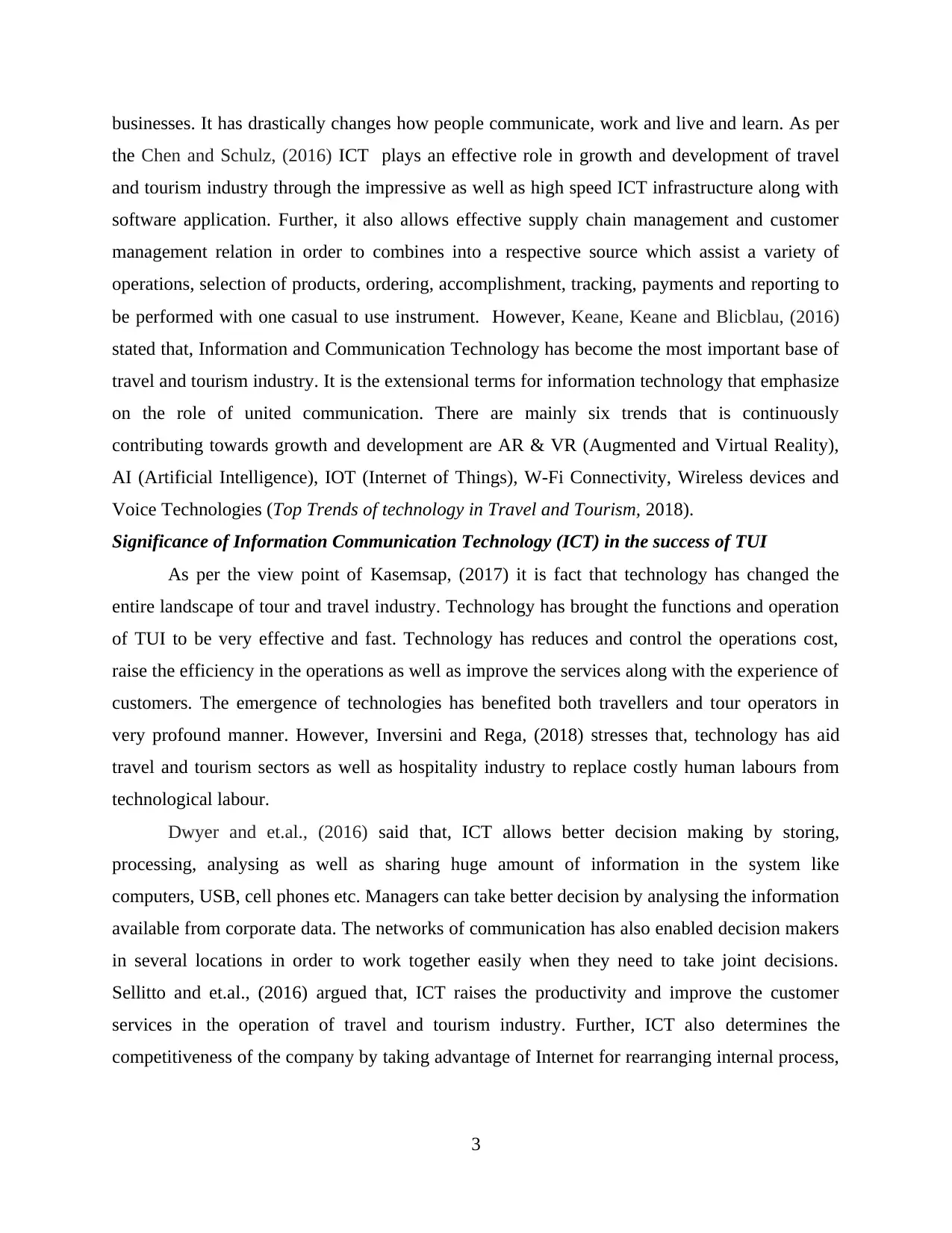
businesses. It has drastically changes how people communicate, work and live and learn. As per
the Chen and Schulz, (2016) ICT plays an effective role in growth and development of travel
and tourism industry through the impressive as well as high speed ICT infrastructure along with
software application. Further, it also allows effective supply chain management and customer
management relation in order to combines into a respective source which assist a variety of
operations, selection of products, ordering, accomplishment, tracking, payments and reporting to
be performed with one casual to use instrument. However, Keane, Keane and Blicblau, (2016)
stated that, Information and Communication Technology has become the most important base of
travel and tourism industry. It is the extensional terms for information technology that emphasize
on the role of united communication. There are mainly six trends that is continuously
contributing towards growth and development are AR & VR (Augmented and Virtual Reality),
AI (Artificial Intelligence), IOT (Internet of Things), W-Fi Connectivity, Wireless devices and
Voice Technologies (Top Trends of technology in Travel and Tourism, 2018).
Significance of Information Communication Technology (ICT) in the success of TUI
As per the view point of Kasemsap, (2017) it is fact that technology has changed the
entire landscape of tour and travel industry. Technology has brought the functions and operation
of TUI to be very effective and fast. Technology has reduces and control the operations cost,
raise the efficiency in the operations as well as improve the services along with the experience of
customers. The emergence of technologies has benefited both travellers and tour operators in
very profound manner. However, Inversini and Rega, (2018) stresses that, technology has aid
travel and tourism sectors as well as hospitality industry to replace costly human labours from
technological labour.
Dwyer and et.al., (2016) said that, ICT allows better decision making by storing,
processing, analysing as well as sharing huge amount of information in the system like
computers, USB, cell phones etc. Managers can take better decision by analysing the information
available from corporate data. The networks of communication has also enabled decision makers
in several locations in order to work together easily when they need to take joint decisions.
Sellitto and et.al., (2016) argued that, ICT raises the productivity and improve the customer
services in the operation of travel and tourism industry. Further, ICT also determines the
competitiveness of the company by taking advantage of Internet for rearranging internal process,
3
the Chen and Schulz, (2016) ICT plays an effective role in growth and development of travel
and tourism industry through the impressive as well as high speed ICT infrastructure along with
software application. Further, it also allows effective supply chain management and customer
management relation in order to combines into a respective source which assist a variety of
operations, selection of products, ordering, accomplishment, tracking, payments and reporting to
be performed with one casual to use instrument. However, Keane, Keane and Blicblau, (2016)
stated that, Information and Communication Technology has become the most important base of
travel and tourism industry. It is the extensional terms for information technology that emphasize
on the role of united communication. There are mainly six trends that is continuously
contributing towards growth and development are AR & VR (Augmented and Virtual Reality),
AI (Artificial Intelligence), IOT (Internet of Things), W-Fi Connectivity, Wireless devices and
Voice Technologies (Top Trends of technology in Travel and Tourism, 2018).
Significance of Information Communication Technology (ICT) in the success of TUI
As per the view point of Kasemsap, (2017) it is fact that technology has changed the
entire landscape of tour and travel industry. Technology has brought the functions and operation
of TUI to be very effective and fast. Technology has reduces and control the operations cost,
raise the efficiency in the operations as well as improve the services along with the experience of
customers. The emergence of technologies has benefited both travellers and tour operators in
very profound manner. However, Inversini and Rega, (2018) stresses that, technology has aid
travel and tourism sectors as well as hospitality industry to replace costly human labours from
technological labour.
Dwyer and et.al., (2016) said that, ICT allows better decision making by storing,
processing, analysing as well as sharing huge amount of information in the system like
computers, USB, cell phones etc. Managers can take better decision by analysing the information
available from corporate data. The networks of communication has also enabled decision makers
in several locations in order to work together easily when they need to take joint decisions.
Sellitto and et.al., (2016) argued that, ICT raises the productivity and improve the customer
services in the operation of travel and tourism industry. Further, ICT also determines the
competitiveness of the company by taking advantage of Internet for rearranging internal process,
3
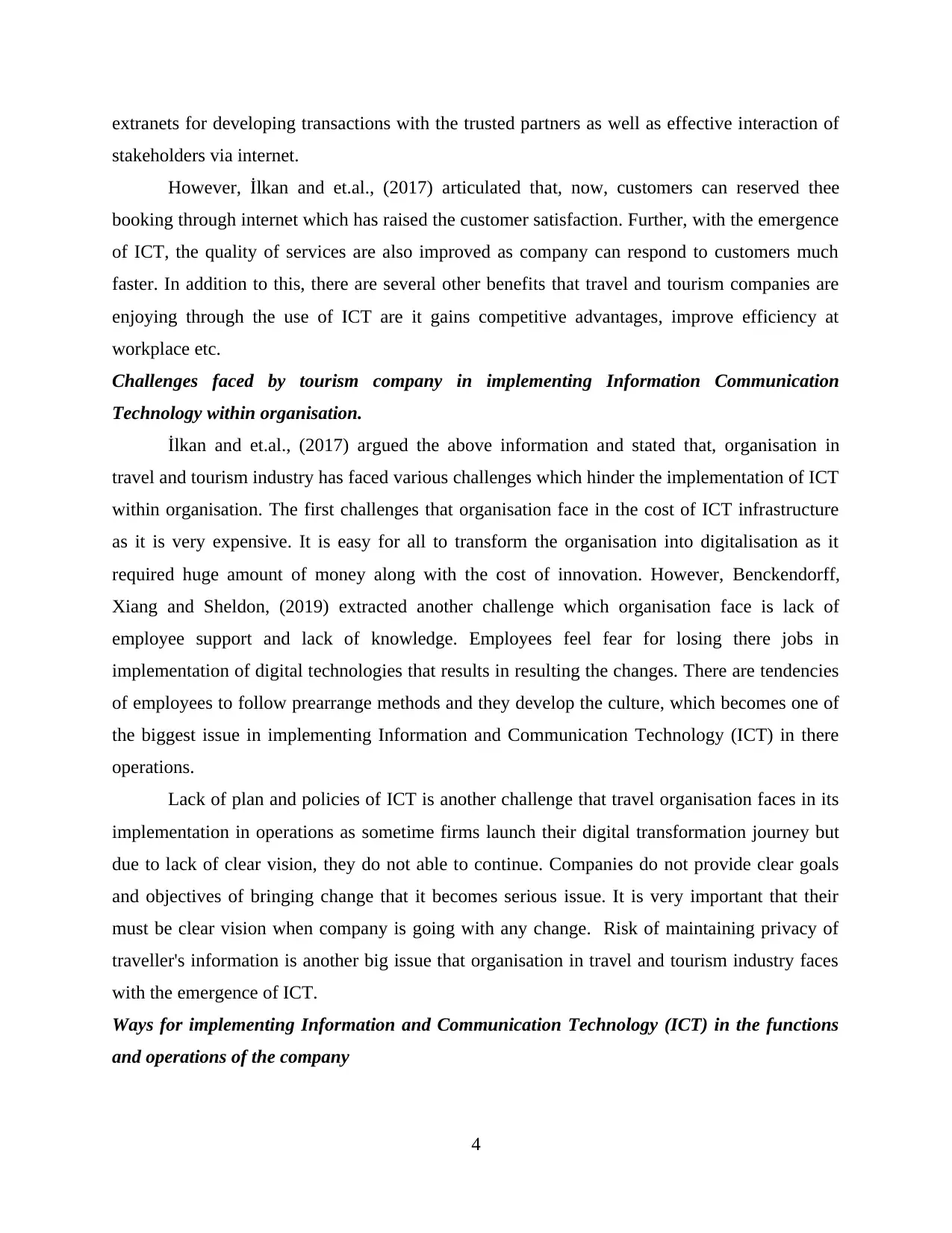
extranets for developing transactions with the trusted partners as well as effective interaction of
stakeholders via internet.
However, İlkan and et.al., (2017) articulated that, now, customers can reserved thee
booking through internet which has raised the customer satisfaction. Further, with the emergence
of ICT, the quality of services are also improved as company can respond to customers much
faster. In addition to this, there are several other benefits that travel and tourism companies are
enjoying through the use of ICT are it gains competitive advantages, improve efficiency at
workplace etc.
Challenges faced by tourism company in implementing Information Communication
Technology within organisation.
İlkan and et.al., (2017) argued the above information and stated that, organisation in
travel and tourism industry has faced various challenges which hinder the implementation of ICT
within organisation. The first challenges that organisation face in the cost of ICT infrastructure
as it is very expensive. It is easy for all to transform the organisation into digitalisation as it
required huge amount of money along with the cost of innovation. However, Benckendorff,
Xiang and Sheldon, (2019) extracted another challenge which organisation face is lack of
employee support and lack of knowledge. Employees feel fear for losing there jobs in
implementation of digital technologies that results in resulting the changes. There are tendencies
of employees to follow prearrange methods and they develop the culture, which becomes one of
the biggest issue in implementing Information and Communication Technology (ICT) in there
operations.
Lack of plan and policies of ICT is another challenge that travel organisation faces in its
implementation in operations as sometime firms launch their digital transformation journey but
due to lack of clear vision, they do not able to continue. Companies do not provide clear goals
and objectives of bringing change that it becomes serious issue. It is very important that their
must be clear vision when company is going with any change. Risk of maintaining privacy of
traveller's information is another big issue that organisation in travel and tourism industry faces
with the emergence of ICT.
Ways for implementing Information and Communication Technology (ICT) in the functions
and operations of the company
4
stakeholders via internet.
However, İlkan and et.al., (2017) articulated that, now, customers can reserved thee
booking through internet which has raised the customer satisfaction. Further, with the emergence
of ICT, the quality of services are also improved as company can respond to customers much
faster. In addition to this, there are several other benefits that travel and tourism companies are
enjoying through the use of ICT are it gains competitive advantages, improve efficiency at
workplace etc.
Challenges faced by tourism company in implementing Information Communication
Technology within organisation.
İlkan and et.al., (2017) argued the above information and stated that, organisation in
travel and tourism industry has faced various challenges which hinder the implementation of ICT
within organisation. The first challenges that organisation face in the cost of ICT infrastructure
as it is very expensive. It is easy for all to transform the organisation into digitalisation as it
required huge amount of money along with the cost of innovation. However, Benckendorff,
Xiang and Sheldon, (2019) extracted another challenge which organisation face is lack of
employee support and lack of knowledge. Employees feel fear for losing there jobs in
implementation of digital technologies that results in resulting the changes. There are tendencies
of employees to follow prearrange methods and they develop the culture, which becomes one of
the biggest issue in implementing Information and Communication Technology (ICT) in there
operations.
Lack of plan and policies of ICT is another challenge that travel organisation faces in its
implementation in operations as sometime firms launch their digital transformation journey but
due to lack of clear vision, they do not able to continue. Companies do not provide clear goals
and objectives of bringing change that it becomes serious issue. It is very important that their
must be clear vision when company is going with any change. Risk of maintaining privacy of
traveller's information is another big issue that organisation in travel and tourism industry faces
with the emergence of ICT.
Ways for implementing Information and Communication Technology (ICT) in the functions
and operations of the company
4
⊘ This is a preview!⊘
Do you want full access?
Subscribe today to unlock all pages.

Trusted by 1+ million students worldwide
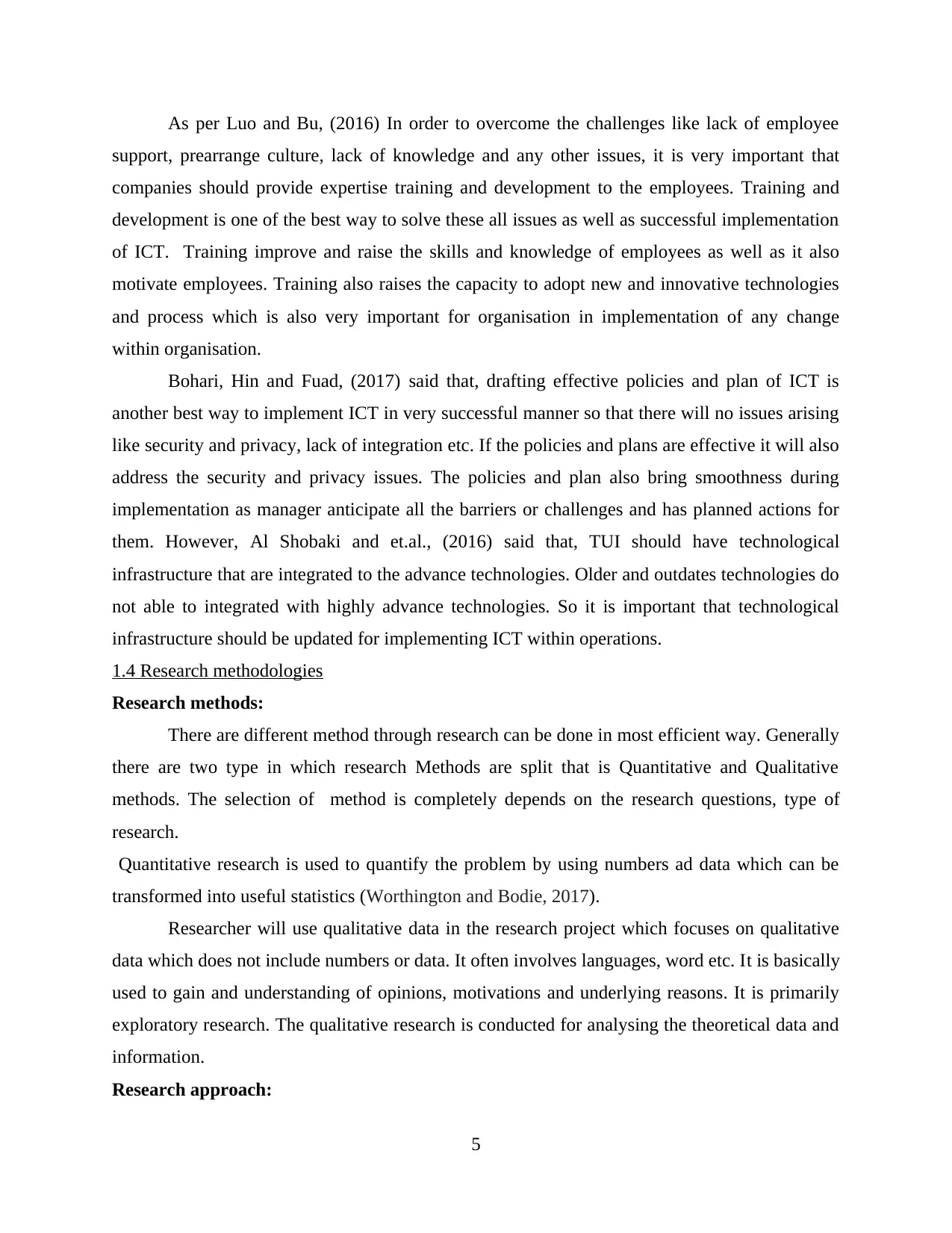
As per Luo and Bu, (2016) In order to overcome the challenges like lack of employee
support, prearrange culture, lack of knowledge and any other issues, it is very important that
companies should provide expertise training and development to the employees. Training and
development is one of the best way to solve these all issues as well as successful implementation
of ICT. Training improve and raise the skills and knowledge of employees as well as it also
motivate employees. Training also raises the capacity to adopt new and innovative technologies
and process which is also very important for organisation in implementation of any change
within organisation.
Bohari, Hin and Fuad, (2017) said that, drafting effective policies and plan of ICT is
another best way to implement ICT in very successful manner so that there will no issues arising
like security and privacy, lack of integration etc. If the policies and plans are effective it will also
address the security and privacy issues. The policies and plan also bring smoothness during
implementation as manager anticipate all the barriers or challenges and has planned actions for
them. However, Al Shobaki and et.al., (2016) said that, TUI should have technological
infrastructure that are integrated to the advance technologies. Older and outdates technologies do
not able to integrated with highly advance technologies. So it is important that technological
infrastructure should be updated for implementing ICT within operations.
1.4 Research methodologies
Research methods:
There are different method through research can be done in most efficient way. Generally
there are two type in which research Methods are split that is Quantitative and Qualitative
methods. The selection of method is completely depends on the research questions, type of
research.
Quantitative research is used to quantify the problem by using numbers ad data which can be
transformed into useful statistics (Worthington and Bodie, 2017).
Researcher will use qualitative data in the research project which focuses on qualitative
data which does not include numbers or data. It often involves languages, word etc. It is basically
used to gain and understanding of opinions, motivations and underlying reasons. It is primarily
exploratory research. The qualitative research is conducted for analysing the theoretical data and
information.
Research approach:
5
support, prearrange culture, lack of knowledge and any other issues, it is very important that
companies should provide expertise training and development to the employees. Training and
development is one of the best way to solve these all issues as well as successful implementation
of ICT. Training improve and raise the skills and knowledge of employees as well as it also
motivate employees. Training also raises the capacity to adopt new and innovative technologies
and process which is also very important for organisation in implementation of any change
within organisation.
Bohari, Hin and Fuad, (2017) said that, drafting effective policies and plan of ICT is
another best way to implement ICT in very successful manner so that there will no issues arising
like security and privacy, lack of integration etc. If the policies and plans are effective it will also
address the security and privacy issues. The policies and plan also bring smoothness during
implementation as manager anticipate all the barriers or challenges and has planned actions for
them. However, Al Shobaki and et.al., (2016) said that, TUI should have technological
infrastructure that are integrated to the advance technologies. Older and outdates technologies do
not able to integrated with highly advance technologies. So it is important that technological
infrastructure should be updated for implementing ICT within operations.
1.4 Research methodologies
Research methods:
There are different method through research can be done in most efficient way. Generally
there are two type in which research Methods are split that is Quantitative and Qualitative
methods. The selection of method is completely depends on the research questions, type of
research.
Quantitative research is used to quantify the problem by using numbers ad data which can be
transformed into useful statistics (Worthington and Bodie, 2017).
Researcher will use qualitative data in the research project which focuses on qualitative
data which does not include numbers or data. It often involves languages, word etc. It is basically
used to gain and understanding of opinions, motivations and underlying reasons. It is primarily
exploratory research. The qualitative research is conducted for analysing the theoretical data and
information.
Research approach:
5
Paraphrase This Document
Need a fresh take? Get an instant paraphrase of this document with our AI Paraphraser
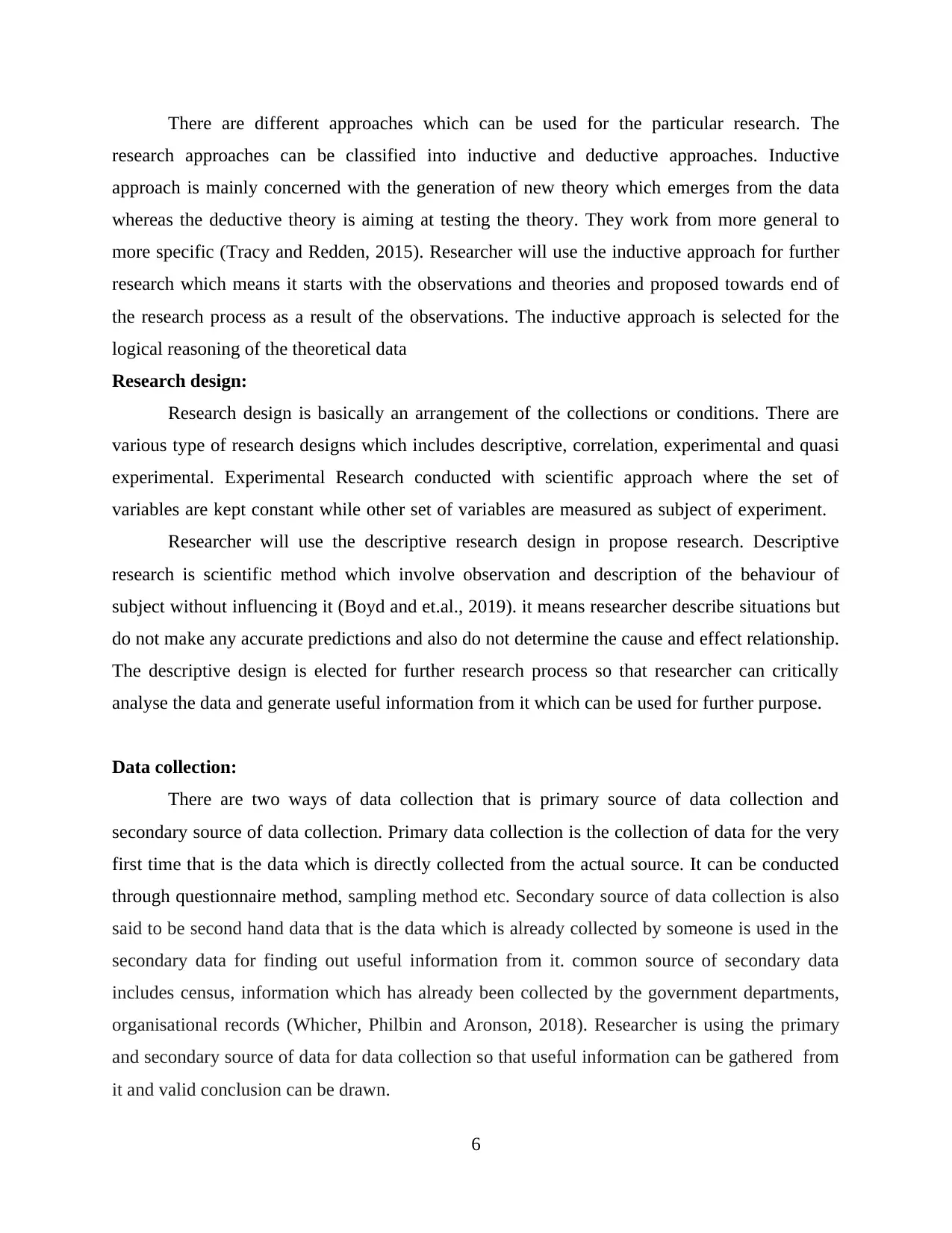
There are different approaches which can be used for the particular research. The
research approaches can be classified into inductive and deductive approaches. Inductive
approach is mainly concerned with the generation of new theory which emerges from the data
whereas the deductive theory is aiming at testing the theory. They work from more general to
more specific (Tracy and Redden, 2015). Researcher will use the inductive approach for further
research which means it starts with the observations and theories and proposed towards end of
the research process as a result of the observations. The inductive approach is selected for the
logical reasoning of the theoretical data
Research design:
Research design is basically an arrangement of the collections or conditions. There are
various type of research designs which includes descriptive, correlation, experimental and quasi
experimental. Experimental Research conducted with scientific approach where the set of
variables are kept constant while other set of variables are measured as subject of experiment.
Researcher will use the descriptive research design in propose research. Descriptive
research is scientific method which involve observation and description of the behaviour of
subject without influencing it (Boyd and et.al., 2019). it means researcher describe situations but
do not make any accurate predictions and also do not determine the cause and effect relationship.
The descriptive design is elected for further research process so that researcher can critically
analyse the data and generate useful information from it which can be used for further purpose.
Data collection:
There are two ways of data collection that is primary source of data collection and
secondary source of data collection. Primary data collection is the collection of data for the very
first time that is the data which is directly collected from the actual source. It can be conducted
through questionnaire method, sampling method etc. Secondary source of data collection is also
said to be second hand data that is the data which is already collected by someone is used in the
secondary data for finding out useful information from it. common source of secondary data
includes census, information which has already been collected by the government departments,
organisational records (Whicher, Philbin and Aronson, 2018). Researcher is using the primary
and secondary source of data for data collection so that useful information can be gathered from
it and valid conclusion can be drawn.
6
research approaches can be classified into inductive and deductive approaches. Inductive
approach is mainly concerned with the generation of new theory which emerges from the data
whereas the deductive theory is aiming at testing the theory. They work from more general to
more specific (Tracy and Redden, 2015). Researcher will use the inductive approach for further
research which means it starts with the observations and theories and proposed towards end of
the research process as a result of the observations. The inductive approach is selected for the
logical reasoning of the theoretical data
Research design:
Research design is basically an arrangement of the collections or conditions. There are
various type of research designs which includes descriptive, correlation, experimental and quasi
experimental. Experimental Research conducted with scientific approach where the set of
variables are kept constant while other set of variables are measured as subject of experiment.
Researcher will use the descriptive research design in propose research. Descriptive
research is scientific method which involve observation and description of the behaviour of
subject without influencing it (Boyd and et.al., 2019). it means researcher describe situations but
do not make any accurate predictions and also do not determine the cause and effect relationship.
The descriptive design is elected for further research process so that researcher can critically
analyse the data and generate useful information from it which can be used for further purpose.
Data collection:
There are two ways of data collection that is primary source of data collection and
secondary source of data collection. Primary data collection is the collection of data for the very
first time that is the data which is directly collected from the actual source. It can be conducted
through questionnaire method, sampling method etc. Secondary source of data collection is also
said to be second hand data that is the data which is already collected by someone is used in the
secondary data for finding out useful information from it. common source of secondary data
includes census, information which has already been collected by the government departments,
organisational records (Whicher, Philbin and Aronson, 2018). Researcher is using the primary
and secondary source of data for data collection so that useful information can be gathered from
it and valid conclusion can be drawn.
6
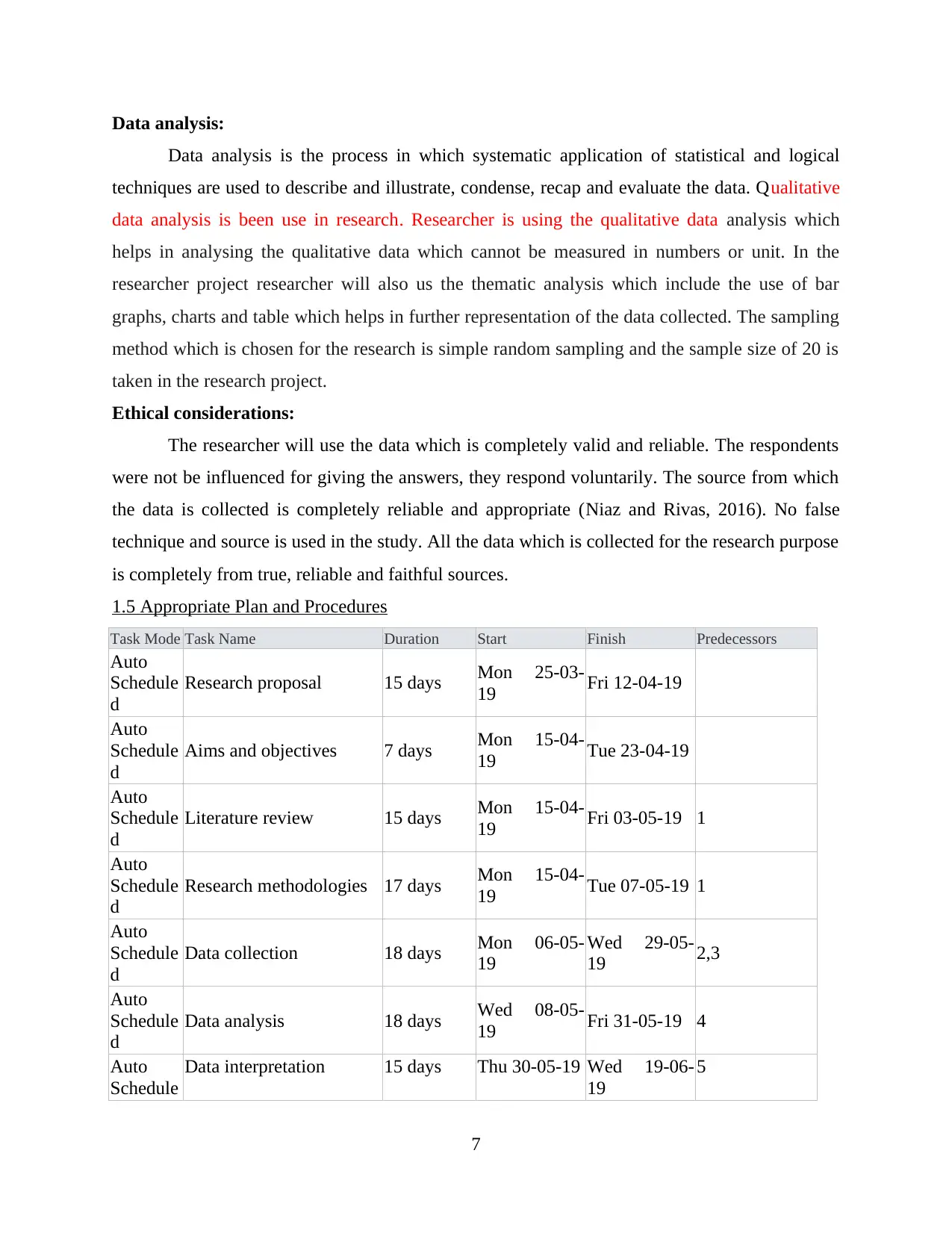
Data analysis:
Data analysis is the process in which systematic application of statistical and logical
techniques are used to describe and illustrate, condense, recap and evaluate the data. Qualitative
data analysis is been use in research. Researcher is using the qualitative data analysis which
helps in analysing the qualitative data which cannot be measured in numbers or unit. In the
researcher project researcher will also us the thematic analysis which include the use of bar
graphs, charts and table which helps in further representation of the data collected. The sampling
method which is chosen for the research is simple random sampling and the sample size of 20 is
taken in the research project.
Ethical considerations:
The researcher will use the data which is completely valid and reliable. The respondents
were not be influenced for giving the answers, they respond voluntarily. The source from which
the data is collected is completely reliable and appropriate (Niaz and Rivas, 2016). No false
technique and source is used in the study. All the data which is collected for the research purpose
is completely from true, reliable and faithful sources.
1.5 Appropriate Plan and Procedures
Task Mode Task Name Duration Start Finish Predecessors
Auto
Schedule
d
Research proposal 15 days Mon 25-03-
19 Fri 12-04-19
Auto
Schedule
d
Aims and objectives 7 days Mon 15-04-
19 Tue 23-04-19
Auto
Schedule
d
Literature review 15 days Mon 15-04-
19 Fri 03-05-19 1
Auto
Schedule
d
Research methodologies 17 days Mon 15-04-
19 Tue 07-05-19 1
Auto
Schedule
d
Data collection 18 days Mon 06-05-
19
Wed 29-05-
19 2,3
Auto
Schedule
d
Data analysis 18 days Wed 08-05-
19 Fri 31-05-19 4
Auto
Schedule
Data interpretation 15 days Thu 30-05-19 Wed 19-06-
19
5
7
Data analysis is the process in which systematic application of statistical and logical
techniques are used to describe and illustrate, condense, recap and evaluate the data. Qualitative
data analysis is been use in research. Researcher is using the qualitative data analysis which
helps in analysing the qualitative data which cannot be measured in numbers or unit. In the
researcher project researcher will also us the thematic analysis which include the use of bar
graphs, charts and table which helps in further representation of the data collected. The sampling
method which is chosen for the research is simple random sampling and the sample size of 20 is
taken in the research project.
Ethical considerations:
The researcher will use the data which is completely valid and reliable. The respondents
were not be influenced for giving the answers, they respond voluntarily. The source from which
the data is collected is completely reliable and appropriate (Niaz and Rivas, 2016). No false
technique and source is used in the study. All the data which is collected for the research purpose
is completely from true, reliable and faithful sources.
1.5 Appropriate Plan and Procedures
Task Mode Task Name Duration Start Finish Predecessors
Auto
Schedule
d
Research proposal 15 days Mon 25-03-
19 Fri 12-04-19
Auto
Schedule
d
Aims and objectives 7 days Mon 15-04-
19 Tue 23-04-19
Auto
Schedule
d
Literature review 15 days Mon 15-04-
19 Fri 03-05-19 1
Auto
Schedule
d
Research methodologies 17 days Mon 15-04-
19 Tue 07-05-19 1
Auto
Schedule
d
Data collection 18 days Mon 06-05-
19
Wed 29-05-
19 2,3
Auto
Schedule
d
Data analysis 18 days Wed 08-05-
19 Fri 31-05-19 4
Auto
Schedule
Data interpretation 15 days Thu 30-05-19 Wed 19-06-
19
5
7
⊘ This is a preview!⊘
Do you want full access?
Subscribe today to unlock all pages.

Trusted by 1+ million students worldwide
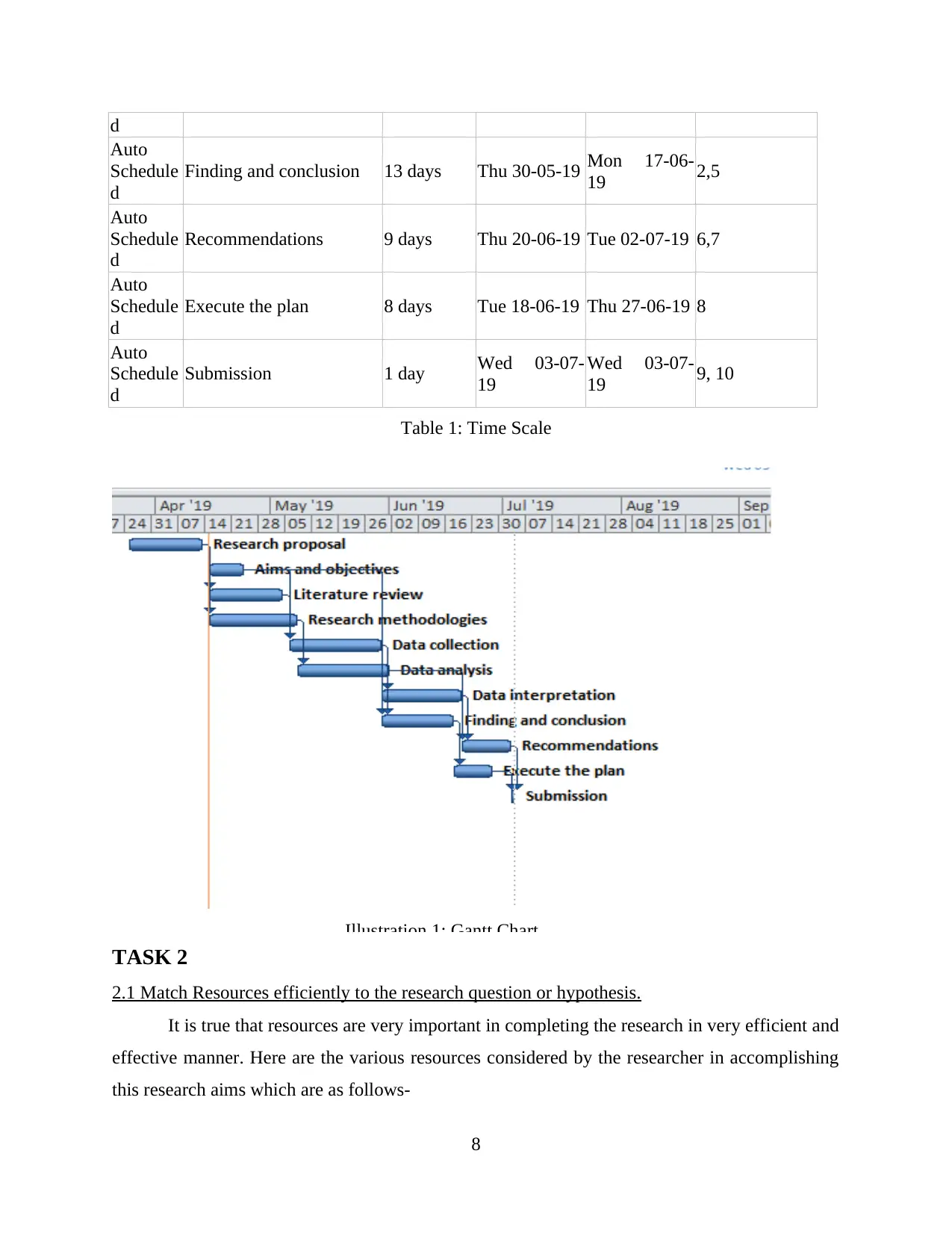
d
Auto
Schedule
d
Finding and conclusion 13 days Thu 30-05-19 Mon 17-06-
19 2,5
Auto
Schedule
d
Recommendations 9 days Thu 20-06-19 Tue 02-07-19 6,7
Auto
Schedule
d
Execute the plan 8 days Tue 18-06-19 Thu 27-06-19 8
Auto
Schedule
d
Submission 1 day Wed 03-07-
19
Wed 03-07-
19 9, 10
Table 1: Time Scale
Illustration 1: Gantt Chart
TASK 2
2.1 Match Resources efficiently to the research question or hypothesis.
It is true that resources are very important in completing the research in very efficient and
effective manner. Here are the various resources considered by the researcher in accomplishing
this research aims which are as follows-
8
Auto
Schedule
d
Finding and conclusion 13 days Thu 30-05-19 Mon 17-06-
19 2,5
Auto
Schedule
d
Recommendations 9 days Thu 20-06-19 Tue 02-07-19 6,7
Auto
Schedule
d
Execute the plan 8 days Tue 18-06-19 Thu 27-06-19 8
Auto
Schedule
d
Submission 1 day Wed 03-07-
19
Wed 03-07-
19 9, 10
Table 1: Time Scale
Illustration 1: Gantt Chart
TASK 2
2.1 Match Resources efficiently to the research question or hypothesis.
It is true that resources are very important in completing the research in very efficient and
effective manner. Here are the various resources considered by the researcher in accomplishing
this research aims which are as follows-
8
Paraphrase This Document
Need a fresh take? Get an instant paraphrase of this document with our AI Paraphraser
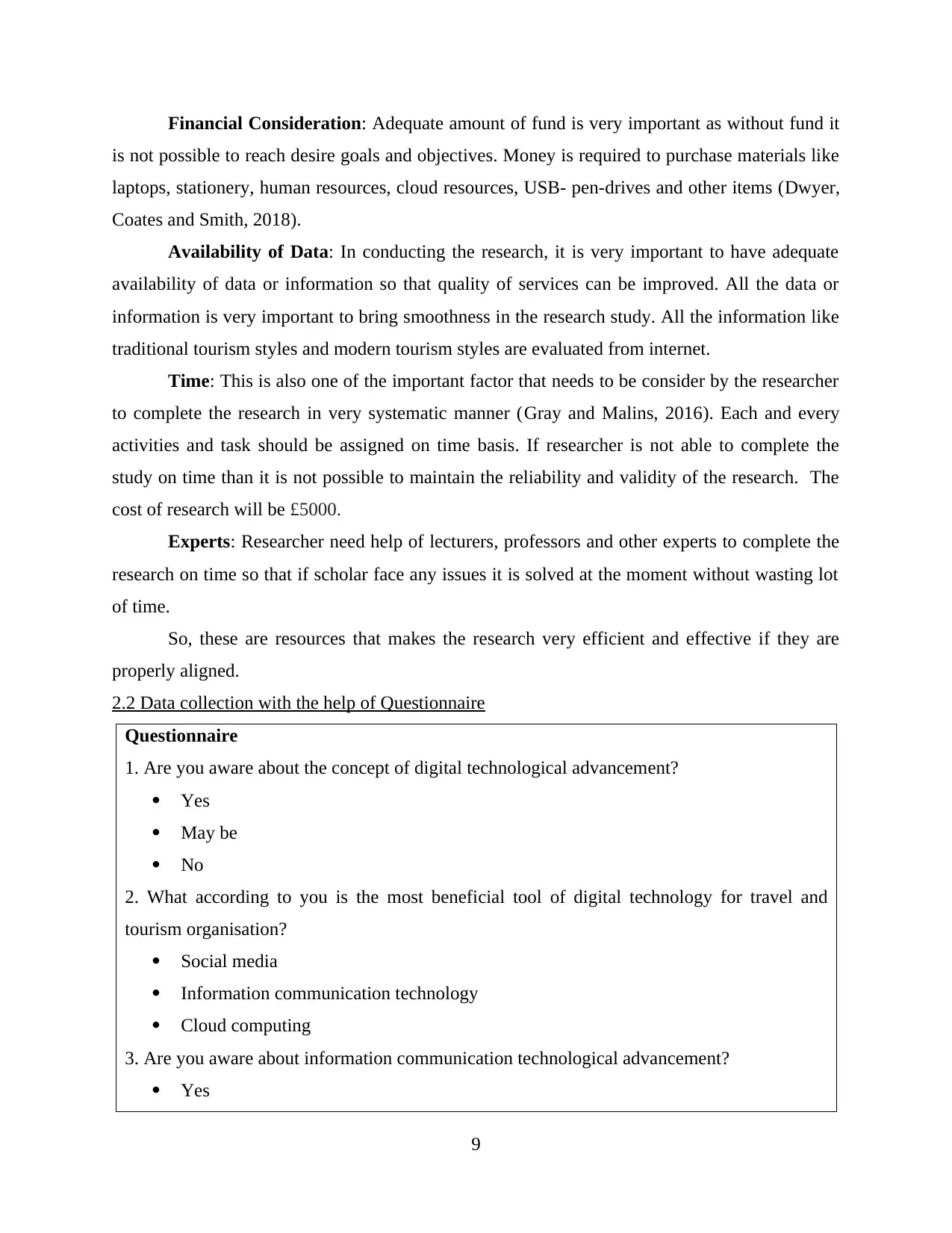
Financial Consideration: Adequate amount of fund is very important as without fund it
is not possible to reach desire goals and objectives. Money is required to purchase materials like
laptops, stationery, human resources, cloud resources, USB- pen-drives and other items (Dwyer,
Coates and Smith, 2018).
Availability of Data: In conducting the research, it is very important to have adequate
availability of data or information so that quality of services can be improved. All the data or
information is very important to bring smoothness in the research study. All the information like
traditional tourism styles and modern tourism styles are evaluated from internet.
Time: This is also one of the important factor that needs to be consider by the researcher
to complete the research in very systematic manner (Gray and Malins, 2016). Each and every
activities and task should be assigned on time basis. If researcher is not able to complete the
study on time than it is not possible to maintain the reliability and validity of the research. The
cost of research will be £5000.
Experts: Researcher need help of lecturers, professors and other experts to complete the
research on time so that if scholar face any issues it is solved at the moment without wasting lot
of time.
So, these are resources that makes the research very efficient and effective if they are
properly aligned.
2.2 Data collection with the help of Questionnaire
Questionnaire
1. Are you aware about the concept of digital technological advancement?
Yes
May be
No
2. What according to you is the most beneficial tool of digital technology for travel and
tourism organisation?
Social media
Information communication technology
Cloud computing
3. Are you aware about information communication technological advancement?
Yes
9
is not possible to reach desire goals and objectives. Money is required to purchase materials like
laptops, stationery, human resources, cloud resources, USB- pen-drives and other items (Dwyer,
Coates and Smith, 2018).
Availability of Data: In conducting the research, it is very important to have adequate
availability of data or information so that quality of services can be improved. All the data or
information is very important to bring smoothness in the research study. All the information like
traditional tourism styles and modern tourism styles are evaluated from internet.
Time: This is also one of the important factor that needs to be consider by the researcher
to complete the research in very systematic manner (Gray and Malins, 2016). Each and every
activities and task should be assigned on time basis. If researcher is not able to complete the
study on time than it is not possible to maintain the reliability and validity of the research. The
cost of research will be £5000.
Experts: Researcher need help of lecturers, professors and other experts to complete the
research on time so that if scholar face any issues it is solved at the moment without wasting lot
of time.
So, these are resources that makes the research very efficient and effective if they are
properly aligned.
2.2 Data collection with the help of Questionnaire
Questionnaire
1. Are you aware about the concept of digital technological advancement?
Yes
May be
No
2. What according to you is the most beneficial tool of digital technology for travel and
tourism organisation?
Social media
Information communication technology
Cloud computing
3. Are you aware about information communication technological advancement?
Yes
9
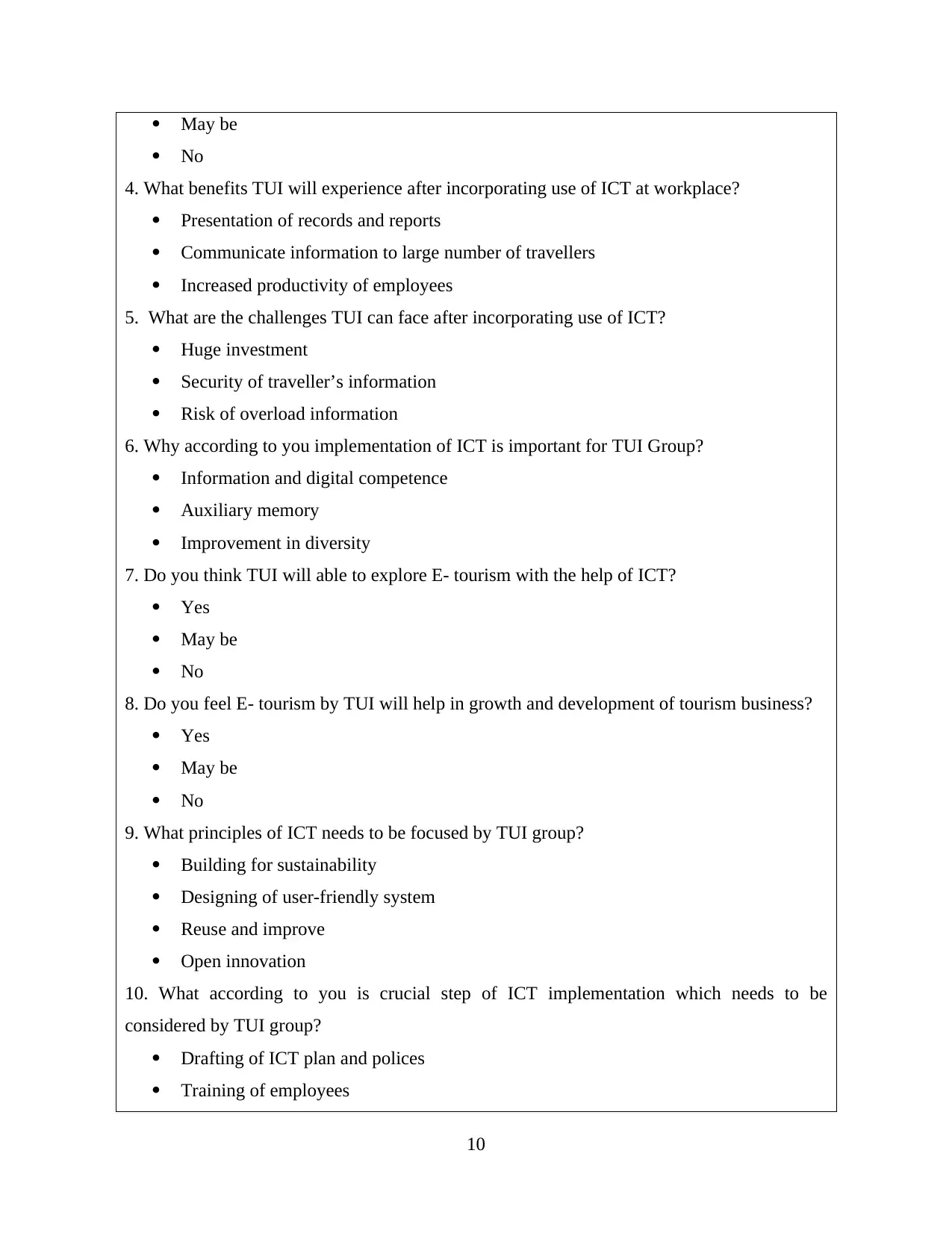
May be
No
4. What benefits TUI will experience after incorporating use of ICT at workplace?
Presentation of records and reports
Communicate information to large number of travellers
Increased productivity of employees
5. What are the challenges TUI can face after incorporating use of ICT?
Huge investment
Security of traveller’s information
Risk of overload information
6. Why according to you implementation of ICT is important for TUI Group?
Information and digital competence
Auxiliary memory
Improvement in diversity
7. Do you think TUI will able to explore E- tourism with the help of ICT?
Yes
May be
No
8. Do you feel E- tourism by TUI will help in growth and development of tourism business?
Yes
May be
No
9. What principles of ICT needs to be focused by TUI group?
Building for sustainability
Designing of user-friendly system
Reuse and improve
Open innovation
10. What according to you is crucial step of ICT implementation which needs to be
considered by TUI group?
Drafting of ICT plan and polices
Training of employees
10
No
4. What benefits TUI will experience after incorporating use of ICT at workplace?
Presentation of records and reports
Communicate information to large number of travellers
Increased productivity of employees
5. What are the challenges TUI can face after incorporating use of ICT?
Huge investment
Security of traveller’s information
Risk of overload information
6. Why according to you implementation of ICT is important for TUI Group?
Information and digital competence
Auxiliary memory
Improvement in diversity
7. Do you think TUI will able to explore E- tourism with the help of ICT?
Yes
May be
No
8. Do you feel E- tourism by TUI will help in growth and development of tourism business?
Yes
May be
No
9. What principles of ICT needs to be focused by TUI group?
Building for sustainability
Designing of user-friendly system
Reuse and improve
Open innovation
10. What according to you is crucial step of ICT implementation which needs to be
considered by TUI group?
Drafting of ICT plan and polices
Training of employees
10
⊘ This is a preview!⊘
Do you want full access?
Subscribe today to unlock all pages.

Trusted by 1+ million students worldwide
1 out of 28
Related Documents
Your All-in-One AI-Powered Toolkit for Academic Success.
+13062052269
info@desklib.com
Available 24*7 on WhatsApp / Email
![[object Object]](/_next/static/media/star-bottom.7253800d.svg)
Unlock your academic potential
Copyright © 2020–2026 A2Z Services. All Rights Reserved. Developed and managed by ZUCOL.



